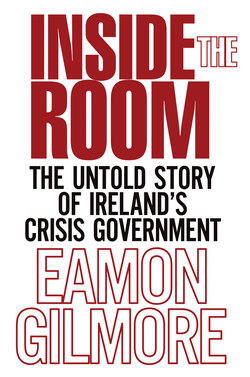Читать книгу Inside the Room - Eamon Gilmore - Страница 12
На сайте Литреса книга снята с продажи.
ОглавлениеCHAPTER 4
FORMING A NATIONAL GOVERNMENT
The day of the count is nervous and tense for election candidates. We wait, like a student waiting for exam results, or a litigant counting down the hours while the jury deliberates. The adrenaline has abated after the intensity of a three- or four-week campaign. Now, the truth tumbles unstoppably from the count centre ballot boxes. There is nothing to do but wait.
Between local and general elections, I have been through ten of these mornings. Candidates have different coping mechanisms. Mine is to busy myself with domestic chores: cleaning out my car, tidying the house, visiting the recycling centre with the detritus of the campaign and shopping for the makings of a post-count get-together with my team later that night or in the early hours of the following morning.
Meanwhile, at the count in the Loughlinstown Leisure Centre, party activists are leaning over the barriers to record the destination of each vote as it is opened by the counter. This tally of votes will continue until a fairly accurate estimate is made of the total first preference votes for each candidate. Long before that insight, candidates are desperate to know how they are doing and it can be difficult to tell since the particular order in which ballot boxes are opened may well differ between strong and weak areas for a candidate. That is why it is essential to have experienced tally-masters at the count centre who can quickly analyse the piles and predict the results, from early indications.
Over the years, this role was fulfilled in our team by my wife, Carol Hanney, who had managed my election campaigns in the early part of my career. By 9.45 am or 10 am at the latest, she could predict whether I was safe or struggling, and make quite an accurate prediction of the election outcome in the constituency.
The count of Saturday 26 February 2011 started like none I had ever previously experienced. Our tally master on the day, Frank O’Connor, rang me at around 10 a.m. with the good news that I was likely to top the poll (which would have been a first for me in a general election). It was unclear whether or not Ivana Bacik would take a second seat.
Earlier that morning, RTÉ had broadcast the results of an exit poll which put Fine Gael on 36.1 per cent, Labour on 20.5 per cent, Fianna Fáil on 15.1 per cent, Sinn Féin on 10.1 per cent, Independents on 15.5 per cent and Greens on 2.5 per cent. As expected, the political map was being redrawn. If confirmed in the real count, I would be leading Labour to its best ever general election result, with twice the share of the vote we had received at each of the three previous general elections. Labour, for the first time ever, would be the second largest party in the State.
Barry Desmond rang me early that morning to congratulate me on both my own re-election and on the Party’s performance. Barry had been the Labour TD for Dun Laoghaire from 1969 until his election to the European Parliament in 1989. Although we had been constituency rivals for a time, Barry and his wife Stella became fond friends and strong supporters of mine in the constituency. I was always glad of his experience and wise counsel, and that morning I especially welcomed his warm call.
But the overall result was still uncertain. If the Fine Gael tally was understated, they could yet form a single-party government or pick up enough support from Fine Gael-leaning Independents to form a minority government. We would not know that for definite until the final votes had been counted, well into Sunday. In the end, Fine Gael got seventy-six seats, just seven short of an overall majority of 83. Fianna Fáil with twenty seats were down to a quarter of their normal size. The Greens were wiped out. Sinn Féin had made a significant breakthrough with fourteen seats and there were nineteen Independents, including the ultra-left parties. Labour won thirty-seven seats with almost 432,000 (19.4 per cent) first preference votes. I had just led Labour to its greatest ever electoral success.
